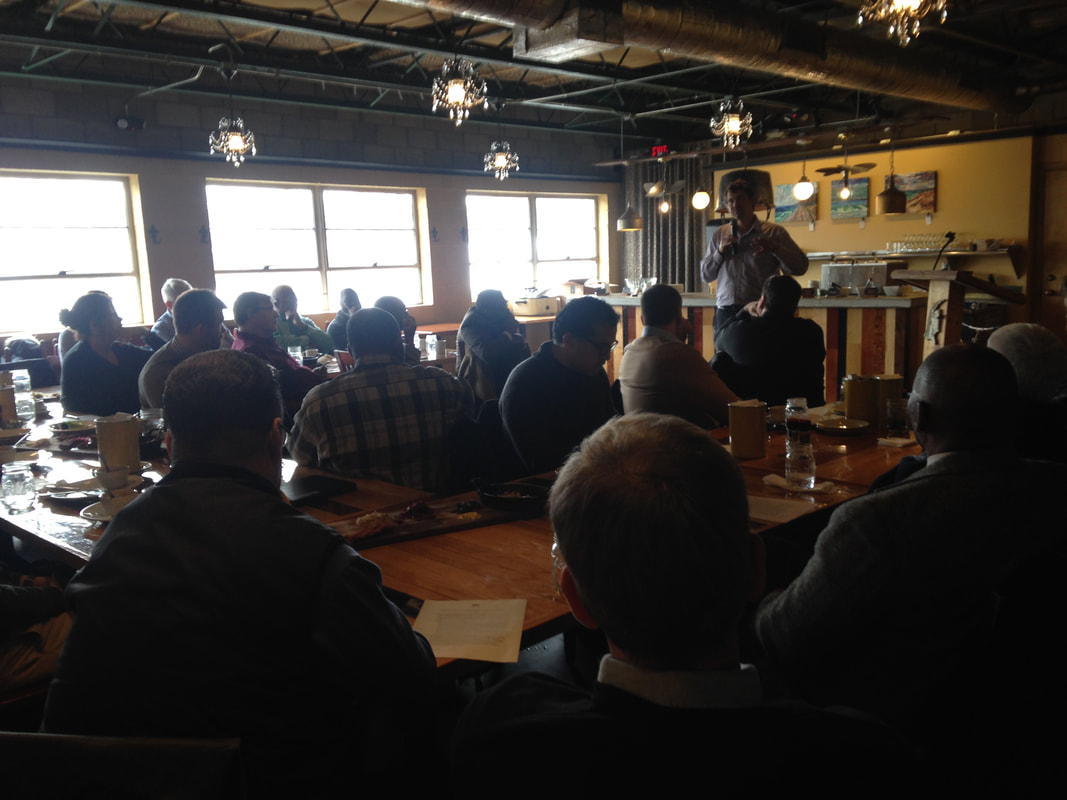|
On Thursday, January 18, 2018 the Grand Rapids Association of Pastors met in an upper room at The Old Goat to hear from LINC's Jeremy DeRoo about changes LINC would like to see in policing policies in Grand Rapids--and to continue to discern how local pastors can be involved.
DeRoo spoke about the results of a recent traffic survey that found that African-American and Hispanic drivers were stopped more often than white drivers, and when they were stopped, their cars were searched twice as often as white drivers' cars were. He noted that this wasn't just the influence of a few individuals, but the result of discriminatory practices across the department: "When you have problems that are systematic in this way, there are no easy answers. We've called for the police department to do bias testing so they can work with individuals, but it's also necessary to look at the structure, at training, policies, oversight. so change will take place." He brought the pastors up to speed on some of those structures, particularly committees that have varying levels of oversight over policing issues:
Since the Civilian Appeals Board (CAB) can review the findings of the Internal Affairs Department, and review civilian complaints against police officers, DeRoo spend some time talking about how this board works. It consists of 3 residents appointed by the mayor, and 6 appointed by the City Commissioners. DeRoo noted that they reviewed only one case last year. He believes that the process is set up to reduce the likelihood of residents filing an appeal.
DeRoo also noted that the CAB is limited in what it can do because they don't have the authority to investigate complaints, and they are not permitted to speak directly with the civilian making the appeal. The Board can only review what is presented to them. In addition, because they rely on civilians to appeal, they are unable to notice whether there are patterns of excessive force or instances of bias. LINC is calling for the CAB to not only be given the authority to investigate complaints, but also for the Board to automatically receive a copy of any investigation into police misconduct. Moreover, they believe the CAB should receive reports from both the internal review and the State Police investigation into any officer-involved shooting; now those reports go to the prosecutor's office. DeRoo said that this means that "the level of analysis has a prosecutorial standard, not a community values standard." LINC would like to see more civilian input into standards of conduct in the police department, and giving the CAB authority to investigate and more access to reports of misconduct and officer-involved shootings would help that happen. LINC is also calling for the city and the department to implement the remaining items in the 12-point plan to improve community and police relations three years ago (that are now two years overdue), and to take action on any of the recommendations that came out of the traffic study (8 months later and none of them have been implemented). DeRoo said, "Grand Rapids keep things in community studies forever. We need to see actual change in actual policies this year--in training policies, union contracts, civilian oversight. The vast majority of officers are good people who've gotten into the job for the right reasons...but systems get the results that systems are designed to get. We need to design training structures so police officers are acting in ways we want police officers to act." Pastor Nathaniel Moody said that the Executive Board of G-RAP is committed to keep on meeting with the police unions, in particular, to "help officers recognize the value in changes in policy that may be 'imposed' on them." Moody wants to see the conversation change: "From 'did the officer do something illegal' to 'are we changing the ways we are policing communities that feel they are being oppressed by the police department.'" During the question period, a number of pastors described actions they are taking. Some pastors are appealing to the Department of Civil Rights in Lansing. Others sit on some of those public safety committees. There was discussion as to whether the police department needed to admit that they've done wrong and to recognize that they need to improve, or whether they just need to change their training and policies. Some pastors were on board with acting as support for civilians who wanted to make complaints against the police department. Others wanted us to show support for those in city government who want to move ahead on justice issues. The Executive Team is meeting to come up with concrete plans that pastors can discuss at the February meeting.
0 Comments
|
AuthorNatalie Hart Archives
September 2023
|

 RSS Feed
RSS Feed